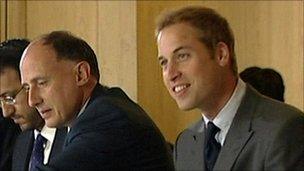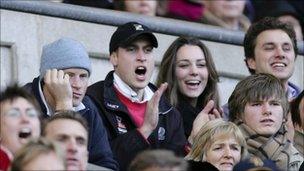Royal wedding: What are the royal advisers for?
- Published

Jamie Lowther-Pinkerton was made private secretary to the princes in 2005
As Prince William and Kate Middleton prepare for their wedding and marriage, and look forward ultimately to assuming the roles of King and Queen, they are helped and guided by a carefully-selected background team. BBC royal correspondent Peter Hunt looks at the importance and limitations of the work of the royal advisers.
He's dealt with bears in Alaska; he's tackled drug barons in Colombia, and now he is confronting perhaps the most varied challenge of his career - planning a wedding for a future King and a future Queen.
When Jamie Lowther-Pinkerton was appointed Prince William and Prince Harry's private secretary, he possessed some crucial attributes.
The old Etonian spoke their "language". They were embarking on military careers. He is an ex-SAS officer who served in the 1991 Gulf War and in Bosnia.
The actor Ewan McGregor - who received training from Mr Lowther-Pinkerton before setting off on a round-the-world motorbike journey - has written about how the former major could have "stepped out of the textbook for English army officers. Tall, skinny, patrician and quietly authoritative".
Mr Lowther-Pinkerton wasn't entering an alien world when he crossed the threshold of St James's Palace six years ago.
In the 1980s, he worked as an equerry [military assistant] to the late Queen Mother. He has recalled how, at their first meeting over lunch, they discussed the best way of judging distance when flicking peas with a fork.
It's a skill Sir David Manning is unlikely to have deployed during his distinguished diplomatic career. The former foreign policy adviser to Tony Blair during the Iraq War is another of William and Kate's key aides.
He knows how Whitehall works, which will prove invaluable as William increasingly focuses on his future as a constitutional monarch. Sir David's foreign policy experience will also be exploited as the couple's first overseas tour - probably to Canada - is planned.
How that trip is received and reported will be the responsibility of Miguel Head, the couple's young, bright press secretary.
He moved from the Ministry of Defence after Prince Harry encountered him and was impressed by him during his time in Afghanistan. In the sometimes fickle royal world, it helps to have been hand-picked by one of the principals.
In the shadows
It is the job of this triumvirate to guide William and Kate while, largely, remaining in the shadows.
Aside from complementing her husband-to-be, Kate's future direction is unclear.

Kate and her aides are expected to support sports and arts projects
This side of the wedding, there doesn't appear to be any rush to embrace causes. When choosing projects to support, her aides are likely to look, initially, to the creative arts and to sport.
William's ultimate role is in his genes. In the meantime, he is working as an RAF search-and-rescue pilot and, with his younger brother, backing charities that support young people, service people and the environment.
As William and Kate pursue their interests and duties in the months and years ahead, can their officials make a difference? The second-in-line to the throne has, on more than one occasion, talked of the need to be "in control".
He's a cautious individual, scarred by the trauma of his early life, who does challenge the advice he receives.
Historic opportunity
The prince, while still a student, very clearly set out his stall when I conducted his first ever television interview seven years ago.
"I really want to be in control of my own life. If I don't agree with what someone is saying or what someone is pushing on me, then I won't do it. If I'm wrong and they're right, and people tell me that, then obviously I'll change my mind," he said.
"I'm always open for people saying I'm wrong, because most of the time I am. I hate losing control. It's very important to see what you want to do and go for it."
Sir David is well aware of the limitations of the role of adviser. When he was by Tony Blair's side, he tried and failed to persuade him to remove a sentence from a crucial letter the then-prime minister was sending to George Bush before the Iraq invasion.
Aside from any potential frustrations, these three men have an historic opportunity to shape the future of the British monarchy.
For now though, their focus is on more mundane, but nevertheless vital matters such as the wedding dress, the flowers, and how to deal with the great and the good who don't get invited to the wedding.